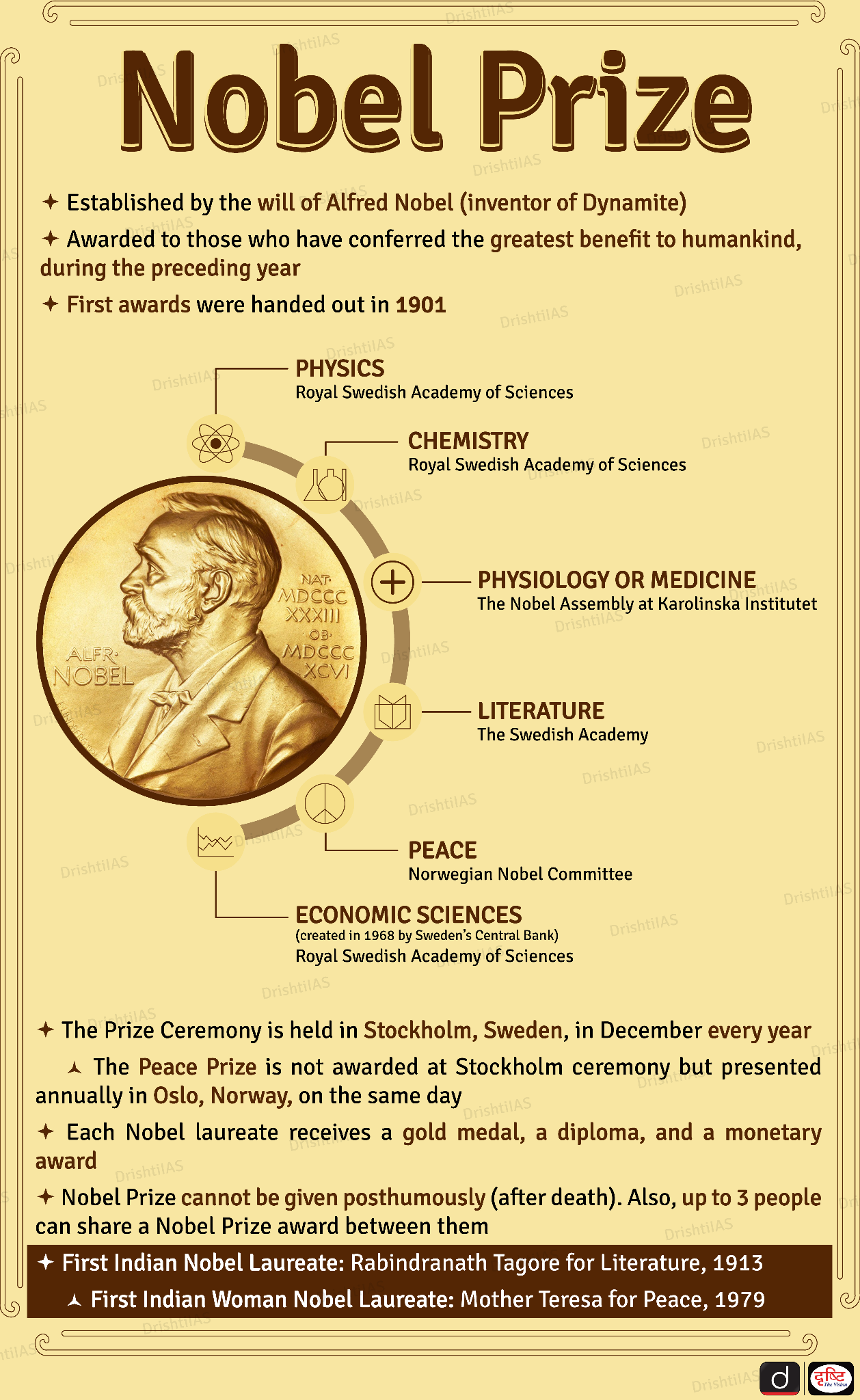Nobel Prize for Economics 2024 | 17 Oct 2024
Why in News?
The Nobel Prize for Economics 2024 is awarded to Daron Acemoglu, Simon Johnson, and James A. Robinson “for their studies of how institutions are formed and affect prosperity”.
- The modern-day significance of their work in understanding why some countries are wealthy while others remain poor.
- The prize of 11 million krona (USD 1.1 million) will be shared between the recipients in recognition of their contributions.
What are the Key Focus Areas of the Study?
- The research by the three economists explored how different institutional structures, particularly in countries colonised by Europeans, influenced the path to prosperity.
- In regions where Europeans faced high mortality rates, they were less likely to settle and more likely to establish extractive institutions, which often persisted into the modern era.
- The study highlighted that institutional differences, rather than geography or culture, play a decisive role in economic outcomes.
- The example of the divided city of Nogales, where the US side has greater economic opportunities and political rights compared to the Mexican side, illustrated how institutions impact prosperity.
- Nogales is Arizona, on the US-Mexico border. It is directly adjacent to Heroica Nogales, its twin city located in Mexico.
- The two cities are separated by International Avenue, which serves as the border between the two nations.
- The example of the divided city of Nogales, where the US side has greater economic opportunities and political rights compared to the Mexican side, illustrated how institutions impact prosperity.
What are the Key Facts About Winners?
- Simon Johnson:
- He is best known for his time at the International Monetary Fund (IMF) (2007-2008), and currently a professor at the Massachusetts Institute of Technology (MIT).
- Co-authored the book Power and Progress: Our Thousand-Year Struggle Over Technology and Prosperity (2023) with Daron Acemoglu.
- Emphasised that poverty in many countries stems from entrenched political and economic institutional arrangements, making solutions complex and long-term.
- Daron Acemoglu:
- Professor at MIT and a frequent collaborator with Simon Johnson.
- Noted that their work broadly supports democracy, stating that countries transitioning from non-democratic regimes typically see significant economic growth within 8-9 years, but cautioned that democracy is not an easy solution.
- Co-authored Why Nations Fail: The Origins of Power, Prosperity, and Poverty (2012) with James A. Robinson.
- James A. Robinson:
- Professor at the University of Chicago and co-author of Why Nations Fail with Daron Acemoglu.
- Based on their work, he expressed scepticism about China’s ability to maintain economic prosperity under its repressive political system, citing historical examples like the Soviet Union.
- Highlighted that many societies, including the United States, have transitioned into inclusive societies, overcoming past systems of oppression and privilege.
What is the Nobel Prize in Economic Sciences?
- About:
- The prize, formally known as the Sveriges Riksbank Prize in Economic Sciences in Memory of Alfred Nobel, was established in 1968 by the Swedish central bank.
- It complements the annual Nobel Prizes in physics, chemistry, medicine, literature, and peace, which were set up according to Alfred Nobel’s will.
- Other Economics Notable Laureates:
- In 2023, Claudia Goldin received the award for her research on gender pay gaps.
- In 2022, Ben Bernanke, Douglas Diamond, and Philip Dybvig won for their work on banks and financial crises.
- Other notable laureates include Friedrich Hayek for economic theory, William Nordhaus for climate change analysis, and Paul Krugman for trade theory.
- In 2019, Abhijit Banerjee, Esther Duflo, and Michael Kremer were recognized for their work on poverty alleviation.
- Gender disparity in Nobel Prizes:
- The economics prize is the second most male-dominated after physics, with only three female recipients.
- This reflects the historical underrepresentation of women in scientific and economic fields.
Other Nobel Prize 2024
- Literature: South Korean author Han Kang
- Physics: John J. Hopfield and Geoffrey E. Hinton
- Physiology or Medicine: Victor Ambros and Gary Ruvkun
- Chemistry: David Baker, Demis Hassabis and John M. Jumper
UPSC Civil Services Examination, Previous Year Question (PYQ)
Prelims:
Q. Nobel Prize winning scientist James D. Watson is known for his work in which area? (2008)
(a) Metallurgy
(b) Meteorology
(c) Environmental protection
(d) Genetics
Ans: (d)


